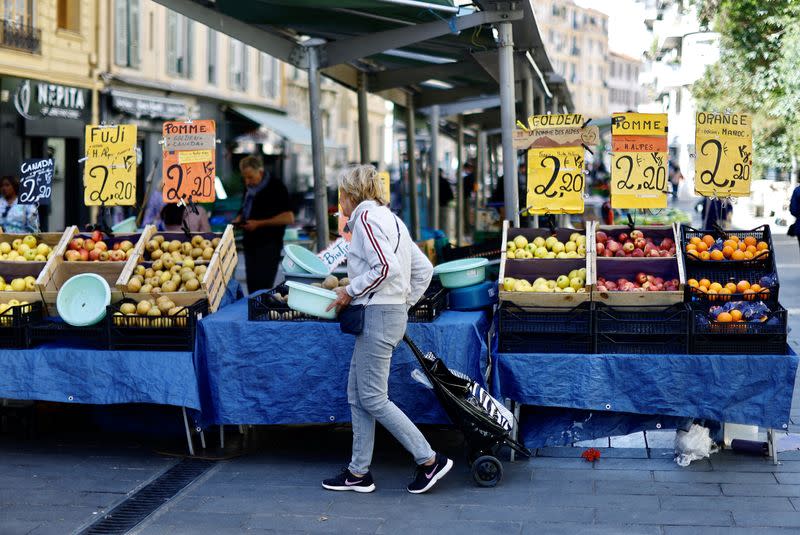French GDP edges up in first quarter despite strikes and high inflation

By Geert De Clercq
PARIS (Reuters) -The French economy grew slightly in the first quarter, despite a series of strikes against the government's pension reform bill, but inflation remained stubbornly high, rising to nearly six percent in April.
Statistics agency INSEE data showed GDP edging up 0.2% in Q1, in line with expectations, after a flat fourth quarter, helped by household consumption, which was steady after falling one percent in the last three months of 2022.
Inflation in the euro zone's second-largest economy increased more than expected to 5.9% year-on-year in April, from 5.7% in March, which INSEE blamed partly on higher energy prices, as the year-on-year fall in energy prices was smaller than in March.
Prices for services and tobacco also increased, but food prices fell. Month-on-month, inflation eased to 0.6% in April from 0.9% in March, in part due to lower prices for fresh food.
French 10-year bond yields [FR10YT=RR] rose three basis points to 3.063% following the release of the inflation data.
"April figures highlight that the fight against inflation is far from over, while the negative impact of higher interest rates is likely to intensify as the year progresses,” S&P Economics Director Diego Iscaro said in a note.
French Budget Minister Gabriel Attal said the economy was doing relatively well, adding that this was an opportunity to reduce state deficits swollen by unprecedented government action to protect consumers from the impact of the COVID-19 pandemic and inflation in recent years.
"The time for 'whatever the cost' is over now ... we need to be rigorous with public finances," he told franceinfo radio.
He said the budget deficit had come down from 9% in 2020 and 6.5% in 2021 to 4.7% last year, and that the government remained on track to cut it further to 2.7% in 2027.
But he warned about higher debt servicing costs - France now borrows at about 3% from 1% a year ago - saying that by 2027 the cost of servicing the country's debt could be France's biggest budget spending item.
GDP data showed that French food consumption fell for the fifth consecutive quarter, but energy demand rebounded and stronger trade figures also helped.
Overall output of goods and services was up 0.4% in Q1, having risen just 0.1% in Q4 2022. The refining industry rebounded, with output jumping 13.1% after falling 11.4% in the previous quarter as strikes in March had been less widespread than in October.
Services again improved slightly, up 0.2% from plus 0.1% in Q4, driven by a strong restaurant and hotel industry, whose output grew 1.5% after expanding just 0.2% in Q4.
French central bank chief Francois Villeroy de Galhau said last month France's full-year 2023 GDP would grow by "a little more" than the 0.3% the bank had forecast in December.
Earlier this week, Germany raised its 2023 GDP forecast to 0.4% from 0.2%. Spain said on Friday Q1 GDP grew 3.8% on an annual basis.
(Reporting by Geert De Clercq, Editing by Dominique Vidalon, Shri Navaratnam and Christina Fincher)